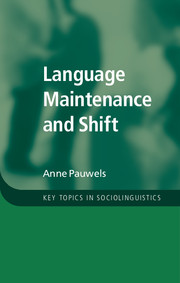Book contents
- Frontmatter
- Dedication
- Contents
- Acknowledgements
- Introduction
- PART I HISTORY, CONCEPTS, CONTEXTS AND APPROACHES
- 1 Pioneers in the study of language maintenance and language shift
- 2 Concepts, contexts and approaches to the study of language maintenance and shift
- PART II INVESTIGATING LANGUAGE MAINTENANCE AND SHIFT: COLLECTING AND ANALYSING DATA
- PART III IDENTIFYING AND UNDERSTANDING TRENDS AND PATTERNS IN THE DYNAMICS OF LANGUAGE MAINTENANCE AND SHIFT
- PART IV LANGUAGE MAINTENANCE EFFORTS AND REVERSING LANGUAGE SHIFT
- PART V FUTURE DEVELOPMENTS IN THE STUDY OF LANGUAGE MAINTENANCE AND SHIFT
- References
- Index
- References
1 - Pioneers in the study of language maintenance and language shift
from PART I - HISTORY, CONCEPTS, CONTEXTS AND APPROACHES
Published online by Cambridge University Press: 05 August 2016
- Frontmatter
- Dedication
- Contents
- Acknowledgements
- Introduction
- PART I HISTORY, CONCEPTS, CONTEXTS AND APPROACHES
- 1 Pioneers in the study of language maintenance and language shift
- 2 Concepts, contexts and approaches to the study of language maintenance and shift
- PART II INVESTIGATING LANGUAGE MAINTENANCE AND SHIFT: COLLECTING AND ANALYSING DATA
- PART III IDENTIFYING AND UNDERSTANDING TRENDS AND PATTERNS IN THE DYNAMICS OF LANGUAGE MAINTENANCE AND SHIFT
- PART IV LANGUAGE MAINTENANCE EFFORTS AND REVERSING LANGUAGE SHIFT
- PART V FUTURE DEVELOPMENTS IN THE STUDY OF LANGUAGE MAINTENANCE AND SHIFT
- References
- Index
- References
Summary
THE ESTABLISHMENT OF LM AND LS AS A SEPARATE FIELD OF ENQUIRY
Although tracing the exact origins of this field of enquiry is no doubt a fascinating enterprise, it is best left to forensic enthusiasts more knowledgeable than me in discovering the relevant historical data. The task of identifying the origins and pioneers is further complicated by the fact that this area of study is intricately intertwined with other areas such as the study of language contact, bi- and multilingualism, language death and language change. Trying to disentangle the origins of each of these is probably futile. However, these complexities and complications should not be an excuse for ignoring the contexts and phenomena that encouraged scholars to establish LM and LS as a significant field of enquiry linked to the overarching fields of language contact and multilingualism.
There is a considerable degree of consensus that LM and LS emerged as a field of enquiry in the mid-twentieth century and that it was initially linked to contexts of language contact arising from migration, especially from the ‘old’ world, Europe, to the ‘new’ world, North America and, later, predominantly Australia and New Zealand.
A key text in its establishment is undoubtedly the paper entitled ‘Language maintenance and language shift as a field of enquiry. A definition of the field and suggestions for its future development’, written by Joshua Fishman in 1964. In this article he states:
The study of language maintenance and language shift is concerned with the relationship between change (or stability) in habitual language use, on the one hand, and ongoing psychological, social or cultural processes, on the other hand, when populations differing in language use are in contact with each other. That languages (or language variants) SOMETIMES replace each other, among SOME speakers, particularly in CERTAIN types or domains of language behavior, under SOME conditions of intergroup contact, has long aroused curiosity and comment. However, it is only in quite recent years that this topic has been recognized as a field of systematic inquiry among professional students of language behavior. (Fishman 1964: 35)
SPRACHINSELFORSCHUNG – STUDY OF LINGUISTIC ENCLAVES – AS A FORERUNNER OF THE FIELD
In Fishman's (1964) seminal text he identifies scholars such as Uriel Weinreich, Einar Haugen, Heinz Kloss and Charles Ferguson as key contributors to the establishment of the field, at least in the Anglophone world.
Information
- Type
- Chapter
- Information
- Language Maintenance and Shift , pp. 9 - 16Publisher: Cambridge University PressPrint publication year: 2016
